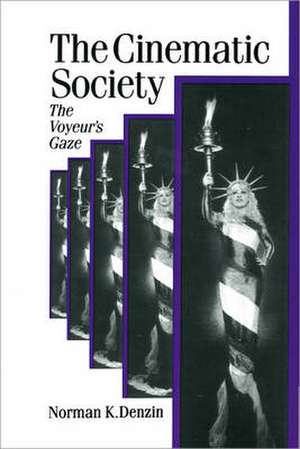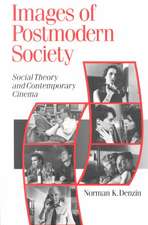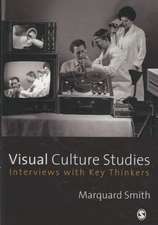The Cinematic Society: The Voyeur's Gaze: Published in association with Theory, Culture & Society
Autor Norman K. Denzinen Limba Engleză Paperback – 9 apr 1995
Din seria Published in association with Theory, Culture & Society
-
 Preț: 189.83 lei
Preț: 189.83 lei -
 Preț: 444.19 lei
Preț: 444.19 lei -
 Preț: 443.01 lei
Preț: 443.01 lei -
 Preț: 393.42 lei
Preț: 393.42 lei -
 Preț: 280.42 lei
Preț: 280.42 lei -
 Preț: 443.93 lei
Preț: 443.93 lei -
 Preț: 392.71 lei
Preț: 392.71 lei - 8%
 Preț: 445.18 lei
Preț: 445.18 lei -
 Preț: 307.51 lei
Preț: 307.51 lei -
 Preț: 426.57 lei
Preț: 426.57 lei -
 Preț: 393.17 lei
Preț: 393.17 lei -
 Preț: 394.42 lei
Preț: 394.42 lei - 18%
 Preț: 1491.48 lei
Preț: 1491.48 lei - 15%
 Preț: 475.52 lei
Preț: 475.52 lei - 15%
 Preț: 486.73 lei
Preț: 486.73 lei - 18%
 Preț: 1364.13 lei
Preț: 1364.13 lei - 18%
 Preț: 1536.08 lei
Preț: 1536.08 lei - 18%
 Preț: 1491.65 lei
Preț: 1491.65 lei - 15%
 Preț: 487.56 lei
Preț: 487.56 lei - 15%
 Preț: 479.46 lei
Preț: 479.46 lei - 15%
 Preț: 479.78 lei
Preț: 479.78 lei - 15%
 Preț: 431.90 lei
Preț: 431.90 lei - 15%
 Preț: 487.05 lei
Preț: 487.05 lei - 18%
 Preț: 1229.47 lei
Preț: 1229.47 lei - 26%
 Preț: 926.65 lei
Preț: 926.65 lei - 18%
 Preț: 1234.14 lei
Preț: 1234.14 lei - 15%
 Preț: 480.44 lei
Preț: 480.44 lei -
 Preț: 479.85 lei
Preț: 479.85 lei - 15%
 Preț: 479.27 lei
Preț: 479.27 lei - 18%
 Preț: 1203.04 lei
Preț: 1203.04 lei - 15%
 Preț: 479.13 lei
Preț: 479.13 lei - 18%
 Preț: 1126.63 lei
Preț: 1126.63 lei - 18%
 Preț: 1234.14 lei
Preț: 1234.14 lei - 15%
 Preț: 478.44 lei
Preț: 478.44 lei - 15%
 Preț: 478.12 lei
Preț: 478.12 lei - 15%
 Preț: 448.04 lei
Preț: 448.04 lei - 18%
 Preț: 1321.90 lei
Preț: 1321.90 lei - 19%
 Preț: 419.03 lei
Preț: 419.03 lei - 18%
 Preț: 886.71 lei
Preț: 886.71 lei - 18%
 Preț: 1182.37 lei
Preț: 1182.37 lei - 18%
 Preț: 1321.58 lei
Preț: 1321.58 lei - 18%
 Preț: 1074.21 lei
Preț: 1074.21 lei - 15%
 Preț: 428.79 lei
Preț: 428.79 lei -
 Preț: 482.14 lei
Preț: 482.14 lei - 15%
 Preț: 466.03 lei
Preț: 466.03 lei - 18%
 Preț: 1141.40 lei
Preț: 1141.40 lei -
 Preț: 477.89 lei
Preț: 477.89 lei
Preț: 480.56 lei
Preț vechi: 565.37 lei
-15% Nou
Puncte Express: 721
Preț estimativ în valută:
91.95€ • 96.01$ • 76.10£
91.95€ • 96.01$ • 76.10£
Carte tipărită la comandă
Livrare economică 05-19 aprilie
Preluare comenzi: 021 569.72.76
Specificații
ISBN-13: 9780803986589
ISBN-10: 0803986580
Pagini: 256
Dimensiuni: 156 x 234 x 14 mm
Greutate: 0.37 kg
Ediția:1
Editura: SAGE Publications
Colecția Sage Publications Ltd
Seria Published in association with Theory, Culture & Society
Locul publicării:London, United Kingdom
ISBN-10: 0803986580
Pagini: 256
Dimensiuni: 156 x 234 x 14 mm
Greutate: 0.37 kg
Ediția:1
Editura: SAGE Publications
Colecția Sage Publications Ltd
Seria Published in association with Theory, Culture & Society
Locul publicării:London, United Kingdom
Recenzii
`Denzin's analysis is closely argued and well supported by his choice of texts' - The Lecturer
`If in The Cinematic Society, Norman Denzin successfully turns film criticism into a criticism of the human sciences, it is because The Cinematic Society takes as its frame of reference those movies in which the voyeur is the prominent figure - movies which Denzin suggests constitute a "reflexive cinema".... Thus while [the book] may seem to some only to be a book of movie reviews, it is a profoundly important piece of sociology precisely in the way it draws on relexive cinema to make a case for a reflexive postmodern sociology. This is not to say that the readings of the various movies are not themselves of interest; indeed they provide the clues for realizing that ours is no longer a cinematic society. The many mechanical devices that appear in these movies and that provide the context in which voyeurism becomes reflexive, point to the coming to dominance of telecommunication that not only poses profound changes in sociology - changes that must bring sociology even beyond the reflexive voyeurism of much postmodern ethnography. Denzin's singular effort to make sociologists attend to the relationship of sociology and the mass media find their clearest expression in The Cinematic Society, the best of his most recent works. Indeed, this is a book that should be worked with, worked through, because it provides a guide to the future of sociology' - Symbolic Interaction
`Professor Denzin's enthralling examination of the evolution of the aesthetic of the voyeur's gaze in cinema, which began with the Peeping Tom films of the 1900's and continues with sex lies and videotape, Silence of the Lambs and the proto-pornographic wave which presently washes through the minds of Western audiences.... Denzin's scholarly book puts together an account of that voyeur's career through a century of cinema, explicating it film by film and genre by genre' - InterMedia
`Adopting as a central premise the notion that the constitution of subjectivity occurs through the gaze of the Other, and locating the voyeur as the anti-hero of cinematic society, Denzin enters into a brilliant analysis of multiple forms of the voyeur's gaze' - Peter McLaren, University of California, Los Angeles
`If in The Cinematic Society, Norman Denzin successfully turns film criticism into a criticism of the human sciences, it is because The Cinematic Society takes as its frame of reference those movies in which the voyeur is the prominent figure - movies which Denzin suggests constitute a "reflexive cinema".... Thus while [the book] may seem to some only to be a book of movie reviews, it is a profoundly important piece of sociology precisely in the way it draws on relexive cinema to make a case for a reflexive postmodern sociology. This is not to say that the readings of the various movies are not themselves of interest; indeed they provide the clues for realizing that ours is no longer a cinematic society. The many mechanical devices that appear in these movies and that provide the context in which voyeurism becomes reflexive, point to the coming to dominance of telecommunication that not only poses profound changes in sociology - changes that must bring sociology even beyond the reflexive voyeurism of much postmodern ethnography. Denzin's singular effort to make sociologists attend to the relationship of sociology and the mass media find their clearest expression in The Cinematic Society, the best of his most recent works. Indeed, this is a book that should be worked with, worked through, because it provides a guide to the future of sociology' - Symbolic Interaction
`Professor Denzin's enthralling examination of the evolution of the aesthetic of the voyeur's gaze in cinema, which began with the Peeping Tom films of the 1900's and continues with sex lies and videotape, Silence of the Lambs and the proto-pornographic wave which presently washes through the minds of Western audiences.... Denzin's scholarly book puts together an account of that voyeur's career through a century of cinema, explicating it film by film and genre by genre' - InterMedia
`Adopting as a central premise the notion that the constitution of subjectivity occurs through the gaze of the Other, and locating the voyeur as the anti-hero of cinematic society, Denzin enters into a brilliant analysis of multiple forms of the voyeur's gaze' - Peter McLaren, University of California, Los Angeles
Cuprins
Introduction
The Birth of the Cinematic Society
The Voyeur's Desire
The Comic Voyeur's Gaze
The Asian Eye
Charlie Chan and Mr Moto Go to the Movies
Flawed Visions
The Obsessive Male Gaze
Women at the Keyhole
Fatal Female Visions
Paranoia and the Erotics of Power
The Voyeur's Future
The Birth of the Cinematic Society
The Voyeur's Desire
The Comic Voyeur's Gaze
The Asian Eye
Charlie Chan and Mr Moto Go to the Movies
Flawed Visions
The Obsessive Male Gaze
Women at the Keyhole
Fatal Female Visions
Paranoia and the Erotics of Power
The Voyeur's Future
Notă biografică
Descriere
Ranging over a rich variety of material from film and film literature, and encompassing a critical interrogation of traditional realist ethnographic and cinematic texts, this book highlights the extent to which the cinema has contributed to the rise of voyeurism throughout society.





















